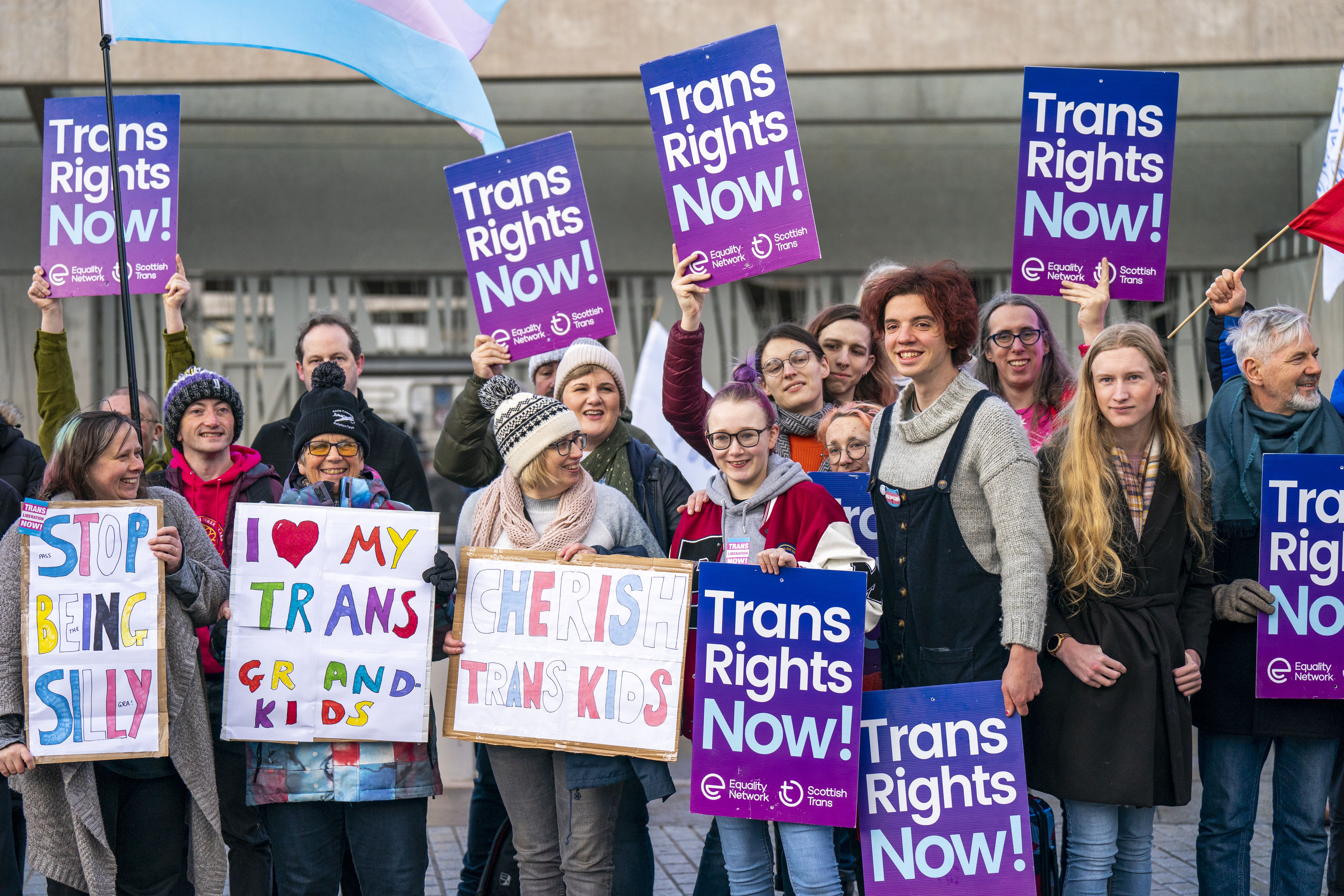Blocking Scotland’s gender reforms would be ‘calamitous’, campaigners say
The Gender Recognition Reform (Scotland) Bill passed in December.

Your support helps us to tell the story
From reproductive rights to climate change to Big Tech, The Independent is on the ground when the story is developing. Whether it's investigating the financials of Elon Musk's pro-Trump PAC or producing our latest documentary, 'The A Word', which shines a light on the American women fighting for reproductive rights, we know how important it is to parse out the facts from the messaging.
At such a critical moment in US history, we need reporters on the ground. Your donation allows us to keep sending journalists to speak to both sides of the story.
The Independent is trusted by Americans across the entire political spectrum. And unlike many other quality news outlets, we choose not to lock Americans out of our reporting and analysis with paywalls. We believe quality journalism should be available to everyone, paid for by those who can afford it.
Your support makes all the difference.Campaigners have warned of “calamitous consequences” for trans people and the devolution settlement if the UK Government blocks Scotland’s gender recognition law.
LGBTQ+ charity Stonewall has written to Prime Minister Rishi Sunak to voice its concerns as the UK Government considers legal advice about whether to use its powers to block the Gender Recognition Reform (Scotland) Bill from becoming law.
MSPs last month passed the Bill by 86 votes to 39, approving reforms which would allow trans people to obtain a gender recognition certificate (GRC) without the need for a medical diagnosis.
The Bill will also allow 16 and 17-year-olds to apply for a GRC for the first time, and would reduce the amount of time a person has to live in their acquired gender before they can be granted the document.
Multiple reports have suggested that the legal advice has given Mr Sunak the legal cover he requires to apply a Section 35 order to prevent the Bill from gaining Royal Assent.
Stonewall said that invoking Section 35 would be a “nuclear option” and would start a constitutional fight over the devolution settlement for Scotland and Wales.
In a letter to Mr Sunak, Stonewall chief executive Nancy Kelley and its chairman Iain Anderson argued against blocking the legislation.
They said they wanted to “urge caution about the calamitous consequences for trans people and the devolution settlement that would come from this decision”.
They said that the Bill has already been extensively considered and has no interaction with the Equality Act.
Concerns have been raised about the impact the Bill could have on single-sex spaces, with some critics saying it could put women at risk – a charge the Scottish Government has repeatedly denied.
In their letter, Ms Kelley and Mr Anderson said: “We have seen it implied that there are uncertain impacts of the Scotland Gender Recognition Reform Bill on the operating of the Equality Act and its provisions for single-sex exemptions.
“This is not true. It does not interact with the Equality Act, and the Scottish Parliament voted on an amendment to explicitly recognise on the face of the Bill that it would have no impact on how the Equality Act operated.
“That means there is no change to the single-sex exemptions in the Equality Act.”
They also said that the impacts on women and girls have been extensively considered and that safeguards were rightly and extensively considered by Scottish parliamentarians over the course of the Bill’s passage.
Mr Sunak spoke during a visit to Scotland on Friday about his concerns over changes the Bill would enact.
Downing Street officials said on Saturday that the full legal advice to ministers has not yet been reviewed and no decisions have been made.
In their letter to the Prime Minister, Mr Anderson and Ms Kelley said that invoking section 35 is a “fight that will only cause harm”.
They also warned that it will “send a strong and clear message to trans people and those who love and care about them, that this Government views trans people as a threat to be contained and does not respect or value trans citizens.”
The Scottish Government says it will “vigorously” contest any moves to challenge the Bill under the Scotland Act.
A UK Government spokeswoman said: “We share the concerns that others – including the Equality and Human Rights Commission and the UN Special Rapporteur on Violence Against Women and Girls – have with the Bill, particularly around safety issues for women and children.
“We are looking closely at these issues, and also the ramifications for the 2010 Equality Act and other UK-wide legislation.
“Our concerns include the protection of single-sex spaces, and the checks and balances included in the process of gaining a legal gender recognition certificate.
“No final decisions have been made and we are considering our next steps.”